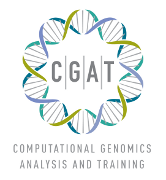Ubuntu 12.04 LTS Installation¶
This installation steps have been tested in Ubuntu 12.04 LTS.The Quick installation uses CGAT supplied scripts for installation, while Manual installation lists all the steps individually.
Quick installation¶
Get a copy of the installation scripts¶
Download and place them into your home directory:
cd
wget https://raw.github.com/CGATOxford/cgat/master/requires.txt
wget https://raw.github.com/CGATOxford/cgat/master/setup-DEBs.sh
wget https://raw.github.com/CGATOxford/cgat/master/setup-CGAT.sh
Install DEB dependencies¶
Become root (or ask your system administrator to do it for you) and run setup-DEBs.sh:
./setup-DEBs.sh
Install a Python virtual environment with the CGAT code collection¶
Do not be root for this step and run setup-CGAT.sh:
./setup-CGAT.sh
Test the installation¶
First activate the CGAT virtual environment:
source $HOME/CGAT/virtualenv-1.10.1/cgat-venv/bin/activate
Then, test the cgat command:
cgat --help
Finish the CGAT virtual environment¶
When you are done, you may deactivate the CGAT virtual environment:
deactivate
Manual installation¶
Install DEB dependencies¶
You can either install them one by one or all at the same time with apt-get:
apt-get install gcc # required by python
apt-get install zlib1g-dev # required by virtualenv
apt-get install libssl-dev # required by pip
apt-get install libbz2-dev # required by bx-python
apt-get install c++ # required by pybedtools
apt-get install libfreetype6-dev # required by matplotlib
apt-get install libpng12-dev # required by matplotlib
apt-get install libblas-dev # required by scipy
apt-get install libatlas-dev # required by scipy
apt-get install liblapack-dev # required by scipy
apt-get install gfortran # required by scipyi
apt-get install libpq-dev # required by PyGreSQL
apt-get install r-base-dev # required by rpy2
apt-get install libreadline-dev # required by rpy2
apt-get install libmysqlclient-dev # required by MySQL-python
apt-get install libboost-dev # required by alignlib
apt-get install libsqlite3-dev # required by CGAT
Build Python 2.7.5¶
Download and build your own, isolated Python installation:
cd
mkdir CGAT
wget http://www.python.org/ftp/python/2.7.5/Python-2.7.5.tgz
tar xzvf Python-2.7.5.tgz
rm Python-2.7.5.tgz
cd Python-2.7.5
./configure --prefix=$HOME/CGAT/Python-2.7.5
make
make install
cd
rm -rf Python-2.7.5
Create a virtual environment¶
Create an isolated virtual environment where all your Python packages will be installed:
cd
cd CGAT
wget --no-check-certificate https://pypi.python.org/packages/source/v/virtualenv/virtualenv-1.10.1.tar.gz
tar xvfz virtualenv-1.10.1.tar.gz
rm virtualenv-1.10.1.tar.gz
cd virtualenv-1.10.1
$HOME/CGAT/Python-2.7.5/bin/python virtualenv.py cgat-venv
source cgat-venv/bin/activate
Install Python dependencies¶
Use pip to install all the packages on which CGAT Code Collection depends on:
pip install cython
pip install numpy
pip install pysam
pip install https://bitbucket.org/james_taylor/bx-python/get/tip.tar.bz2
pip install biopython
pip install pybedtools
pip install matplotlib
pip install scipy
pip install -r https://raw.github.com/CGATOxford/cgat/master/requires.txt
pip install CGAT
Test CGAT Code Collection¶
If everything went fine with the previous steps you should be able to execute the following command:
cgat --help
Finish the CGAT virtual environment¶
When you are done, you may deactivate the CGAT virtual environment:
deactivate
